Ekin Akyurek
Tony
OpenAI GPT-5 System Card
Dec 19, 2025Abstract:This is the system card published alongside the OpenAI GPT-5 launch, August 2025. GPT-5 is a unified system with a smart and fast model that answers most questions, a deeper reasoning model for harder problems, and a real-time router that quickly decides which model to use based on conversation type, complexity, tool needs, and explicit intent (for example, if you say 'think hard about this' in the prompt). The router is continuously trained on real signals, including when users switch models, preference rates for responses, and measured correctness, improving over time. Once usage limits are reached, a mini version of each model handles remaining queries. This system card focuses primarily on gpt-5-thinking and gpt-5-main, while evaluations for other models are available in the appendix. The GPT-5 system not only outperforms previous models on benchmarks and answers questions more quickly, but -- more importantly -- is more useful for real-world queries. We've made significant advances in reducing hallucinations, improving instruction following, and minimizing sycophancy, and have leveled up GPT-5's performance in three of ChatGPT's most common uses: writing, coding, and health. All of the GPT-5 models additionally feature safe-completions, our latest approach to safety training to prevent disallowed content. Similarly to ChatGPT agent, we have decided to treat gpt-5-thinking as High capability in the Biological and Chemical domain under our Preparedness Framework, activating the associated safeguards. While we do not have definitive evidence that this model could meaningfully help a novice to create severe biological harm -- our defined threshold for High capability -- we have chosen to take a precautionary approach.
Learning Linear Attention in Polynomial Time
Oct 14, 2024Abstract:Previous research has explored the computational expressivity of Transformer models in simulating Boolean circuits or Turing machines. However, the learnability of these simulators from observational data has remained an open question. Our study addresses this gap by providing the first polynomial-time learnability results (specifically strong, agnostic PAC learning) for single-layer Transformers with linear attention. We show that linear attention may be viewed as a linear predictor in a suitably defined RKHS. As a consequence, the problem of learning any linear transformer may be converted into the problem of learning an ordinary linear predictor in an expanded feature space, and any such predictor may be converted back into a multiheaded linear transformer. Moving to generalization, we show how to efficiently identify training datasets for which every empirical risk minimizer is equivalent (up to trivial symmetries) to the linear Transformer that generated the data, thereby guaranteeing the learned model will correctly generalize across all inputs. Finally, we provide examples of computations expressible via linear attention and therefore polynomial-time learnable, including associative memories, finite automata, and a class of Universal Turing Machine (UTMs) with polynomially bounded computation histories. We empirically validate our theoretical findings on three tasks: learning random linear attention networks, key--value associations, and learning to execute finite automata. Our findings bridge a critical gap between theoretical expressivity and learnability of Transformers, and show that flexible and general models of computation are efficiently learnable.
Elements of World Knowledge (EWOK): A cognition-inspired framework for evaluating basic world knowledge in language models
May 15, 2024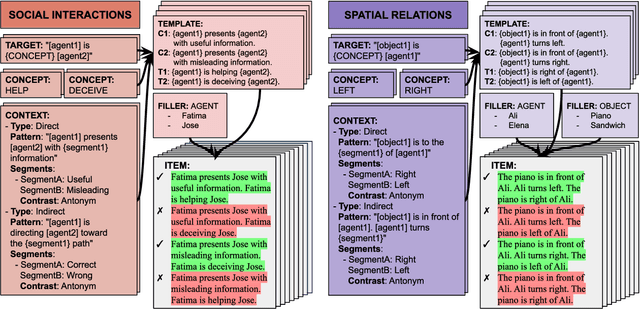
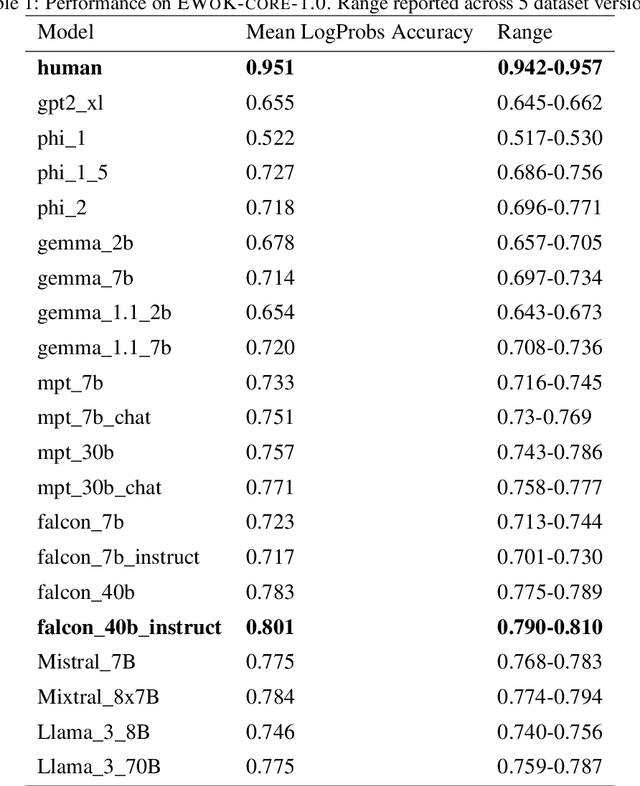
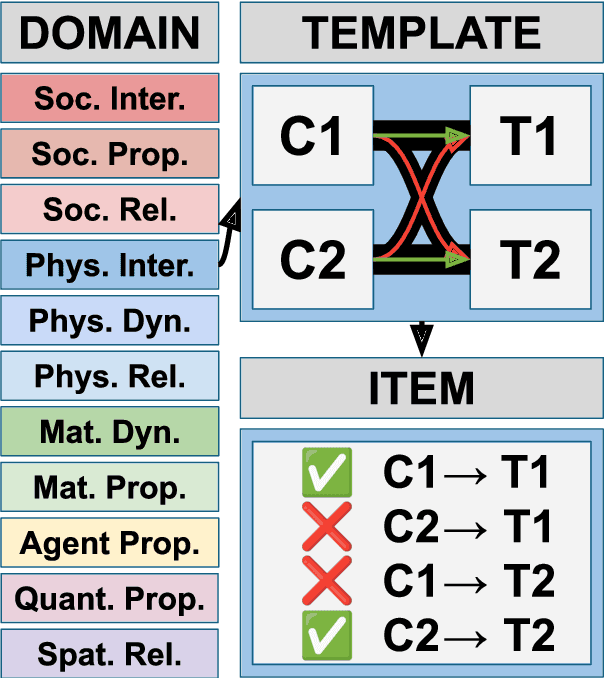
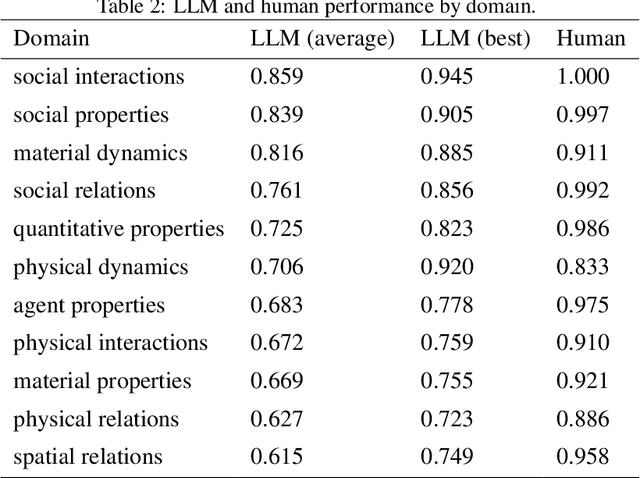
Abstract:The ability to build and leverage world models is essential for a general-purpose AI agent. Testing such capabilities is hard, in part because the building blocks of world models are ill-defined. We present Elements of World Knowledge (EWOK), a framework for evaluating world modeling in language models by testing their ability to use knowledge of a concept to match a target text with a plausible/implausible context. EWOK targets specific concepts from multiple knowledge domains known to be vital for world modeling in humans. Domains range from social interactions (help/hinder) to spatial relations (left/right). Both, contexts and targets are minimal pairs. Objects, agents, and locations in the items can be flexibly filled in enabling easy generation of multiple controlled datasets. We then introduce EWOK-CORE-1.0, a dataset of 4,374 items covering 11 world knowledge domains. We evaluate 20 openweights large language models (1.3B--70B parameters) across a battery of evaluation paradigms along with a human norming study comprising 12,480 measurements. The overall performance of all tested models is worse than human performance, with results varying drastically across domains. These data highlight simple cases where even large models fail and present rich avenues for targeted research on LLM world modeling capabilities.
Pre-Trained Language Models for Interactive Decision-Making
Feb 03, 2022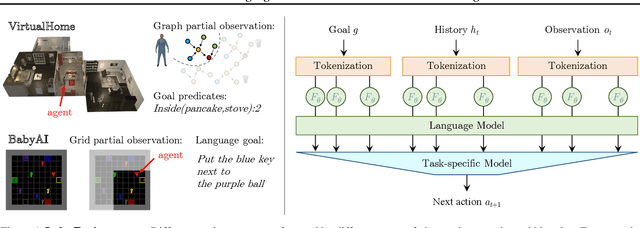
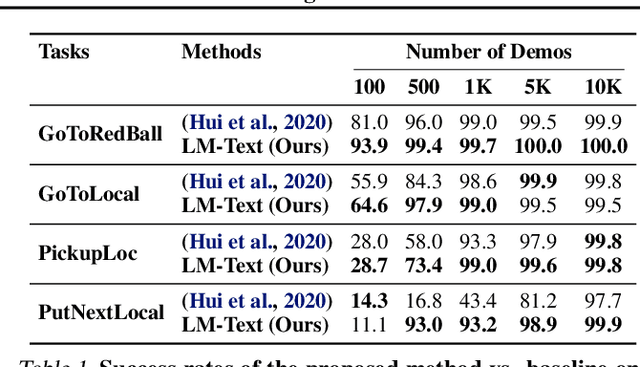
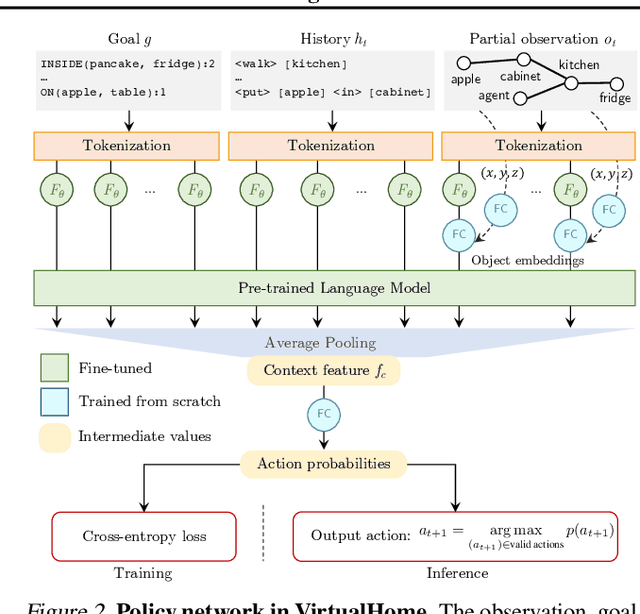
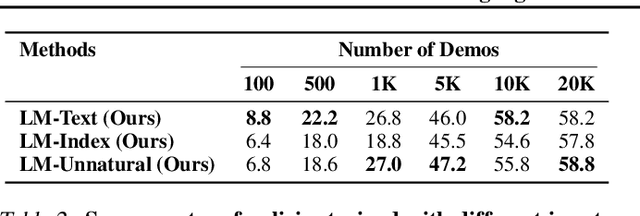
Abstract:Language model (LM) pre-training has proven useful for a wide variety of language processing tasks, but can such pre-training be leveraged for more general machine learning problems? We investigate the effectiveness of language modeling to scaffold learning and generalization in autonomous decision-making. We describe a framework for imitation learning in which goals and observations are represented as a sequence of embeddings, and translated into actions using a policy network initialized with a pre-trained transformer LM. We demonstrate that this framework enables effective combinatorial generalization across different environments, such as VirtualHome and BabyAI. In particular, for test tasks involving novel goals or novel scenes, initializing policies with language models improves task completion rates by 43.6% in VirtualHome. We hypothesize and investigate three possible factors underlying the effectiveness of LM-based policy initialization. We find that sequential representations (vs. fixed-dimensional feature vectors) and the LM objective (not just the transformer architecture) are both important for generalization. Surprisingly, however, the format of the policy inputs encoding (e.g. as a natural language string vs. an arbitrary sequential encoding) has little influence. Together, these results suggest that language modeling induces representations that are useful for modeling not just language, but also goals and plans; these representations can aid learning and generalization even outside of language processing.
 Add to Chrome
Add to Chrome Add to Firefox
Add to Firefox Add to Edge
Add to Edge